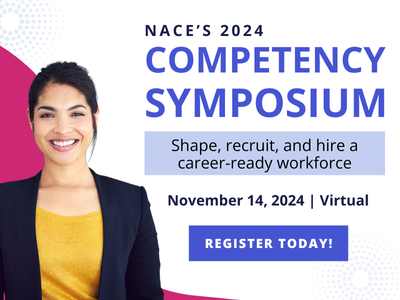Spotlight for Career Services Professionals
The University of Nebraska at Omaha (UNO) Campus Career Council (CCC) is a group of campus advocates from various disciplines that collaborates monthly to support UNO students in achieving their career and professional ambitions through shared knowledge of best practices and continued industry training.
The CCC is the result of a partnership between the university’s Academic and Career Development Center (ACDC) and the College of Business Administration (CBA) Career Center.
“We want to move the conversation about career development forward on campus,” says Laura Sansoni, director of the UNO CBA Career Center.
She also noted that, while UNO has more than 15,800 students, there are only four full-time career professionals dedicated to career development at the institution.
“We do have a lot of ‘career champions’ on campus,” she said, adding that career conversations tied to those champions’ day-to-day work were not occurring. To rectify that, Sansoni says, “We needed to tap into the collective expertise of our champions and others on campus to have big and impactful conversations about careers.”
The CCC has 70 active members across all six of UNO’s colleges and within 18 departments.
“When we started recruiting council members, we were just going to individuals who we knew on campus who had some sort of stake in this and who were advocating for career advising at UNO,” notes Sam Zeitner, assistant director of career advising in the ACDC.
“These are our ‘career champions.’ We started there and had a list of about 20 people. From that point, we developed a Google form through which individuals could self-nominate and department chairs could nominate their employees, as well. We have quite the variety in terms of individuals and disciplines.”
It took about nine months from development of the CCC to its first meeting, which took place in January 2021. Now, the CCC meets on the last Tuesday of every month.
“Depending on the guidance we receive about our return to campus for the fall, we are still determining if our meetings will continue to stay virtual or if we will have some in-person components,” says Sansoni, who adds that Rebecca Atkins, career adviser in the CBA Career Center, has been instrumental in CCC development and management.
During its first meeting, the CCC finalized its mission, vision, values, and goals as follows:
- Mission—The CCC is a group of campus advocates from various disciplines that collaborates regularly to support UNO students in achieving their career and professional ambitions through shared knowledge of best practices and continued industry training.
- Vision—To be the premier network of campus career partners that provides insight, skill building, and counsel to all students in order to reach their desired career and professional goals.
- Values—Career readiness; diversity, equity, accessibility, inclusion (DEAI); professional development; and knowledge sharing
- Goals:
- Bring campus professionals together to discuss workforce challenges, trends, and student career interests.
- Engage faculty and staff in career discussions/outcomes.
- Offer routine professional development to stay current with changing trends and topics.
- Collaborate in unison to deliver specific career education strategies through central communication from the CCC that is decentrally delivered
- Conserve campus resources through joint planning, systems, and industry knowledge sharing.
- Incorporate DEAI into career development conversations.
- Share how to identify DEAI initiatives in industries and companies.
- Facilitate DEAI-focused career programming and participation.
- Bring campus professionals together to discuss workforce challenges, trends, and student career interests.
“We actually outlined these prior to the CCC’s first meeting,” Sansoni says.
“While we have gotten a lot of feedback and we rely on the feedback and topics of interest of the members, we wanted to make this as successful as possible, which means we wanted to make it easy to connect with from the start. We determined the goals and the mission, vision, and values from which the goals are derived to make things actionable and easy to understand when we were recruiting members so we could say that this is specifically what we will be doing on this council.”
The CCC also conducted several polls about topics of interest; questions around career development; frequency, day, and time of meetings; and more because, as Zeitner explains, organizers did not want it to be authoritarian.
“We wanted feedback from the CCC members,” he notes.
“We asked questions to better understand what they need to know and provide them with that information during our meetings.”
Holding the meetings monthly allows the CCC to maintain the momentum of its work.
“Another big part of the decision came in terms of the trends on campus and those reported by NACE, and knowing that things happen in specific months,” Zeitner says.
“If we decided to meet once a semester, for instance, if something happened in June, we could not address it until the fall. By meeting monthly, we can keep everything fresh.”
Sansoni and Zeitner says that, even in its early months, the CCC has yielded positive results.
“One of the biggest benefits so far,” Zeitner says, “is finally being able to get everyone on the same page when it comes to career advising information and what we share with our students. Previously, we didn’t have that forum to discuss what is happening and how we need to address it.”
He adds that an example of this is when the NACE Career Readiness Competencies were updated, individuals on campus who are not NACE members were not aware of the changes.
“Since the ACDC and CBA Career Center are the two main centers providing that information, it was important to get the CCC together to ensure entities across campus are aware of the changes and we can centralize our message,” Zeitner says.
Sansoni and Zeitner point to establishing the mission, vision, values, and goals of the CCC prior to its first meeting and conducting polls to identify the topics for it to address as reasons for the council’s early success. There are several other best practices they recommend to their career services colleagues who are considering developing a campus career council:
- Identify your key partners;
- Determine your campus need for a council, such as resource sharing, event collaboration, and more;
- Listen to member feedback about topics and concerns; and
- Be up front with the time commitment.
“There’s greater energy around career development on the UNO campus because of the CCC,” Sansoni says.
“We know there are other collaborations happening on campus, so the CCC gives them a platform and provides an opportunity for other types of collaborations to happen.”






